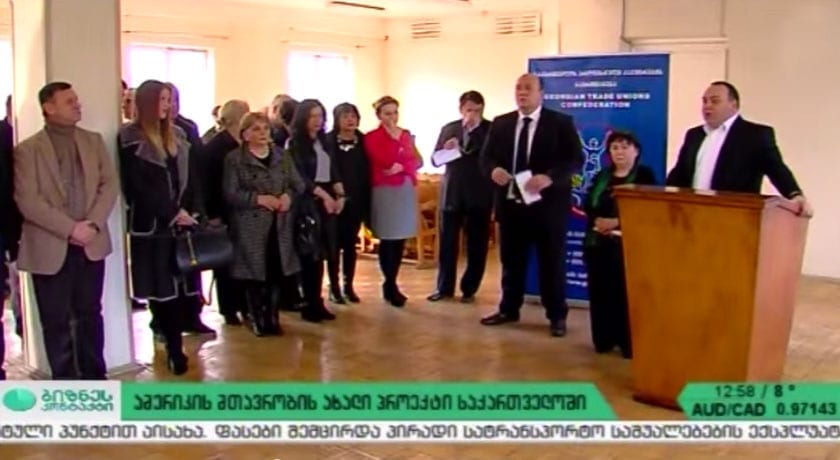
Mar 9, 2015
A new Solidarity Center project in Georgia to strengthen respect for worker rights through union, government and employer engagement will ensure the voice of workers is “a critical part of policymaking” so that “the benefits of economic growth are shared,” says Solidarity Center Executive Director Shawna Bader-Blau.
The Georgian Minister of Labor, U.S. and Georgian government officials, diplomats, nongovernmental organization (NGO) representatives and leaders of the Georgian Trade Union Confederation (GTUC) launched the three-year venture, Strengthening Worker Organizations in Georgia, on March 4 in Tbilisi, the country’s capital. The project is funded by the U.S. Department of Labor and will be implemented by the Solidarity Center in cooperation with the GTUC.
The project focuses on improving worker occupational safety and health. Some 273 workers have been killed on the job in the past six years, and many more seriously injured, likely draining Georgia’s ability to boost its stagnant gross domestic product (GDP). Key elements of the project include increasing GTUC job safety and health inspectors and expanding the number of joint union-management occupational safety and health committees.
In addition, the project involves training workers in negotiating contracts and broadening unions’ ability to promote effective labor law enforcement.
Speaking at the launch, GTUC President Irakli Petriashvili said, “It is very important that the international community keep an eye on any violations aimed at employees.”
“Ultimately, the project, which will build on recent improvements in Georgian labor law, will lead to greater compliance with national labor law and internationally recognized norms and standards,” including the right to form unions, says Stanislaw Cieniuch, Solidarity Center Georgia program director. “Over time, these and other measures will contribute to building a modern, cooperative system of labor-management relations.”
The city’s metro transportation hub, the site of the launch event, was chosen because it is a workplace “where workers and employers have come together in a commitment to decent, safe and productive employment—through collective bargaining,” says Bader-Blau.

Mar 6, 2015
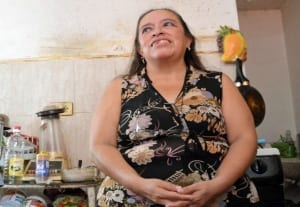
Tonantzin Nava: “As women, we must raise our voices and keep pushing for better opportunities for all of us.”
At an auto parts factory in Piedras Negras, Mexico, women getting off work after midnight board private buses the company pays for to transport them home. But until recently, the bus drivers refused to take the women all the way to their houses, instead letting them off far from their residences and forcing them to walk alone in one of Mexico’s most unsafe areas, especially for women. (El articulo en español aquÍ.)
All that changed after the women joined together and circulated a petition asking their employer to require the bus drivers to take them to their houses, which they now do.
“To me this was important not only because now we can say to our kids that we’ll be back from work safe at night, but also because more women in our neighborhoods will consider working at the factories,” says one worker, Tonantzin Nava. “As women, we must raise our voices and keep pushing for better opportunities for all of us, and to ensure that our jobs provide for our safety.”
The women workers recognized they have the power to stand up for their safety after participating in the Gender and Women’s Empowerment for Action (GEMA) training, a program sponsored by the Solidarity Center and the Border Committee of Women Workers (Comité Fronterizo de Obrer@s, CFO).
Launched in 2013, GEMA (“gemstone” in Spanish), is unique because women workers are at its center. It was designed by and for women workers in the maquilas of Mexico’s northern border, and the workers guide the program facilitators in the types of training, analysis and planning most appropriate and useful for them. GEMA participants tell facilitators they want formal-sector jobs, but with decent working conditions. If maquila jobs—where women predominate—are not decent jobs, they perpetuate gender-based discrimination and violence and do not help families and their communities.
Economic hardship contributes to the daily potential for physical danger, and accentuates the risks that women in particular face. The GEMA program helps women analyze these issues and develop plans of action to address them.
In border areas like Piedras Negras, women make around $1 per hour in the maquiladoras, and most face unsafe and unhealthy conditions in an environment where labor laws are typically not enforced. Chronic injuries such as carpel tunnel and circulation problems from long hours of backbreaking and repetitive work are the norm, yet access to health care and workers’ compensation is sporadic.
Piedras Negras, in Coahuila state, across from Eagle Pass, Texas, is in the heart of northeastern Mexico, where the number of women murdered jumped more than 500 percent between 2001 and 2010. While the cause of these deaths varies, the deterioration of the social fabric, which has enabled such violence to surge unimpeded, stems in large part from the economic marginalization of women and their families.
Across Mexico, some 4,000 women disappeared in 2011–2012, part of a pandemic of violence against women at a time when 10 million workers were unable to provide the basic needs of their families, and when the number of women entering precarious jobs grew faster than the rate at which they were entering well-paid formal sector jobs.
To reach and empower as many women as possible, GEMA participants go on to share their insights and training with other women, meeting with them in their homes, where these “safe” environments provide them the social space to get to know one another and develop bonds of solidarity, figure out their most pressing problems and devise courses of action to address them. The women say GEMA gives them the tools to rebuild the social fabric of their communities.
“In GEMA, we have developed our self-confidence as well as skills and talents that we didn´t even know we had,” says Yohanna Esparza. “I am now facilitating discussion groups with other women and we are starting to walk steadfastly together, with our heads held high, on the path toward our dreams of a better future.”
Other women who have taken part in GEMA have gone on to participate in weekly roundtable meetings with management at an auto parts factory, to channel concerns and develop solutions.
GEMA is now expanding its reach. In 2014, the CFO and Solidarity Center began jointly facilitating a women’s empowerment and leadership program for women mineworkers with the National Union of Mine, Metal, Steel and Similar Workers of the Mexican Republic (SNTMMSSRM) and United Steelworkers. The union leadership is unanimous in declaring that when women are strong, and make their voices heard, unions are strong and everyone benefits from improved living and working conditions—workers, employers and society.
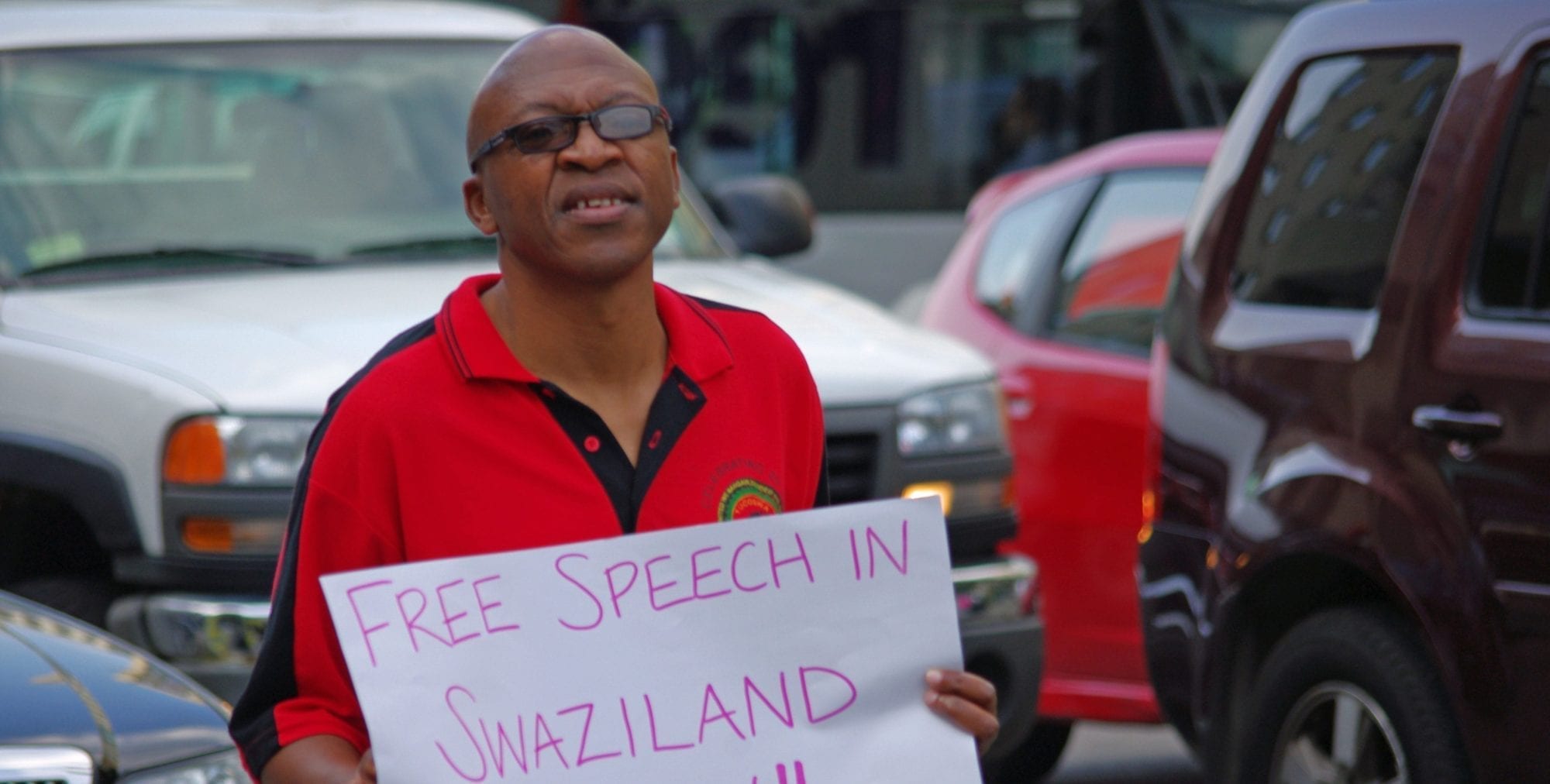
Mar 3, 2015
Accusing workers of discussing democracy, Swazi police broke up a national union meeting over the weekend in Manzini, according to Trade Union Congress of Swaziland (TUCOSWA) Secretary-General Vincent Ncongwane.
“The police said they would crush our meeting if we do not remove any discussion on multiparty democracy because according to the police, and their supervisors, that is not a workers’ agenda,” Ncongwane told Radio France Internationale. “And we said we are not going to remove that.”
Ncongwane said more than 100 police were at the site, and they erected roadblocks to prevent TUCOSWA members from entering the building. When union leaders cited the country’s constitution as allowing freedom of assembly, the police “said to us we are not going to be bothered about us quoting sections of the law,” Ncongwane recounted. “They are going to be interested in applying their discretion.”
The police action is the latest move against worker and human rights in Swaziland. Swaziland authorities continue their nearly three-year refusal to grant legal registration to TUCOSWA, despite the federation making another application in December 2014 under the country’s recently amended Industrial Relations Act. In August 2014, some in the Swazi government falsely accused Ncongwane and human rights lawyer Sipho Gumedze of taking a stand against trade benefits for Swaziland when they were in Washington, D.C., to attend the U.S. Africa Leaders Summit Civil Society Forum.
Earlier in June 2014 the U.S. took the rare step of suspending African Growth and Opportunity Act (AGOA) trade benefits for Swaziland, citing the Swazi government’s systematic violations of fundamental worker rights, including refusal to legally recognize TUCOSWA. Swaziland’s trade unions support AGOA, but maintain that the country must meet benchmarks of the agreement, which include respecting human rights and labor rights.
The 2014 U.S. State Department human rights report cited serious human rights violations in Swaziland, including arbitrary or unlawful killings by the government or its agents; severely restricted freedom of assembly, including violence against protestors; jailing of trade union leaders; the deregistration of TUCOSWA and the banning of strikes.
AGOA had been on the union’s meeting agenda. Garment workers, 90 percent of whom are women, have been especially hard hit. Ncongwane noted that the loss of AGOA has cost many jobs, with 2,000 garment workers already laid off. “We think that there’s going to be a flood of workers that are going to lose jobs just because of the loss of AGOA.”
In addition to non-registration of TUCOSWA and AGOA, trade union leaders also had planned to discuss the increasing casualization of labor, in which more and more workers getting hired on three month-contracts that provide no job stability or living wages. Ncongwane said these issues will be on the agenda for the union’s next meeting, March 14, a date that coincides with the TUCOSWA’s creation in 2012.
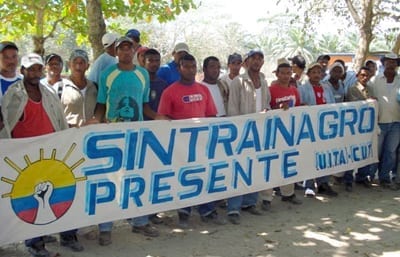
Mar 2, 2015
Gunmen fired on a car carrying Guillermo Rivera and Medardo Cuesta, president and treasurer, respectively, of the Colombian rural workers union SINTRAINAGRO, as they were meeting February 24 with members in Valle del Cauca.
Their vehicle was hit by bullets but the two were unharmed thanks to the reaction of Cuesta’s bodyguard. The National Protection Unit has recently denied Rivera’s requests for protection, citing lack of resources. Cuesta was granted protection while visiting the high-risk Valle del Cauca, but union leaders must be able to safely travel the entire country. The International Union of Food, Agricultural, Hotel, Restaurant, Catering, Tobacco and Allied Workers’ Associations (IUF) has written the Colombian authorities to denounce the attack and again demand adequate protection for threatened union leaders.
SINTRAINAGRO, which organizes banana, palm oil, sugar and flower workers, has had some 750 members and leaders murdered by paramilitary organizations over past decades. The union has expressed support for the ongoing peace negotiations between the government and the rebel group, FARC, but also insists on an end to the decades of impunity for those responsible for years of systematic violence against the labor movement.
This is a crosspost from IUF.
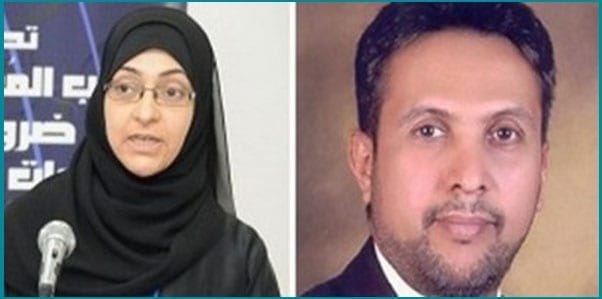
Feb 20, 2015
Leaders of the Bahrain Teachers Association were awarded the 2015 Arthur Svensson Prize for Trade Union Rights this week. The international honor recognizes Mahdi Abu Dheeb and Jalila al-Salman for “their encouragement of strike actions among teachers despite the personal risks they faced, including imprisonment and torture.”
Abu Dheeb, association president, was arrested in 2011 and sentenced to five years in prison. Charges against him included calling for a teachers’ strike. His health is deteriorating, and he is not receiving essential medical aid, according to the foundation.
Al-Salman, now acting union president, was arrested three times for exercising her right to freedom of assembly, for demanding reforms in Bahrain’s educational system and for protesting the killing and suppression of protesters, many of whom were students. Since her release from prison in November 2012, she has been banned from employment and her freedom of speech is restricted.
The Svensson Prize, established by the Norwegian union, Industri Energi, in 2010, is awarded annually to a person or organization that has worked predominately to promote trade union rights and/or strengthen trade union organizations. The announcement occurred as activists and unions around the world participated in a global day of action to support the right to strike.
Napoléon Gómez Urrutia, general secretary of Los Mineros, the National Miners’ and Metalworkers’ Union of Mexico (SNTMMSRM) received the prize in 2014, and Valentin Urusov, the Russian electrician and trade unionist unjustly imprisoned for years in a Siberian penal colony, received it in 2013.






